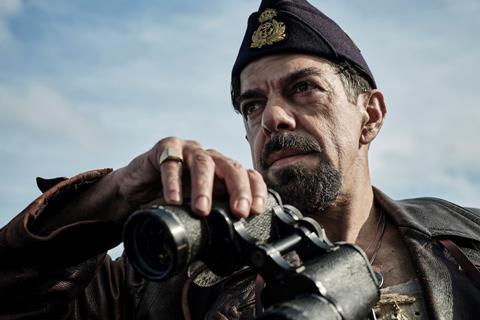Venice opens with this pointed dramatisation of a World War II story in which a Fascist submarine commander rescued the people he torpedoed

Dir: Edoardo De Angelis. Italy. 2023. 121mins
How do you get away with making a film about an Italian Fascist World War II hero at a time when Italy is being led by a far-right alliance, without it being seen as rampant nationalist propaganda? You choose an Italian Fascist submarine commander who was famous for saving people drifting in small boats, at a time when Giorgia Meloni’s government is doing all it can to crack down on Mediterranean sea rescue NGOs. You have to hand it to Neapolitan director Edoardo De Angelis: in a film that is also quite a lot about food, he and his co-writer Sandro Veronesi deliver a masterclass in having your cake and eating it.
Designed to make Italians feel good about being Italian
Comandante is a film designed to make Italians feel good about being Italian – about pasta, sentimental songs and strongly demarcated gender roles – while also telling them how to be good Italians – chiefly by saving people at sea, not blindly following orders and getting on with other Italians whose dialects they don’t understand. Also gloriously Italian is Comandante’s full-analogue set design, which involved the construction of a full scale World War II submarine hull. All this, plus the charismatic central performance of today’s number one Italian leading man, Pierfrancesco Favino, will give the film a big splashy launch when 01 Distribution releases the film in home waters. But Comandante may struggle to attract much interest elsewhere, outside the world-cinema back drawers of screener platforms.
Favino plays Salvatore Todaro, a real-life submarine commander with a reputation as a ‘good Fascist’ (so much so that he has a piazza and a primary school named after him in his native town of Chioggia, near Venice). While fitting him with a corset for a spinal injury, a doctor tells the wincing Todaro that he should enjoy the suffering because “Fascism is pain”; later, alone with his wife, Todaro badmouths the doctor. Comandante is full of little tokens like this that are designed to paint Favino’s character as a maverick rather than a convinced supporter of Mussolini’s regime – his interest in yoga, his gift of clairvoyance. But then why undermine it all by framing Todaro’s wife in a shot that seems to wink at Liliana Cavani’s The Night Porter and its dangerous flirtation with Nazi erotica? Once again, cake is being had and eaten.
The story follows Todaro’s most famous exploit, the sinking of a Belgian merchant ship, the Kabalo, in October 1940, followed by the rescue of its 26 survivors. Before we get there, we learn a lot about life on a submarine, some of it absorbing in a nerdy kind of way, and are introduced to the men Todaro commands. There’s a plump Neapolitan cook (Giuseppe Brunetti), a spivvy southern Italian coral diver (Gianluca Di Gennaro), and Todaro’s fellow Venetian second in command, Vittorio Marcon, a gritty old sea dog enjoyably played by Massimiliano Rossi.
Vogel (Johannes Wirix), one of the seamen on the Belgian ship, handily speaks Italian, and becomes the interpreter between Todaro and the Flemish crew. Neither they nor the submarine captain’s own men can quite believe that he has given the order to sail to the Azores above the surface, exposed to enemy fire, so he can lead the survivors of a ship he himself gave the order to attack to safety. There’s predictable friction between the two crews in this confined space, even a moment of comedy when the Flemings teach the Neapolitan cook to make French (or rather Belgian) fries. Yet nothing can disguise the fact that the rescued sailors are as devoid of true character as the enemy in a classic war film, simply there to feed Todaro with his final line that he did all this “because I’m Italian.”
Glimpses of the oneiric spirit of De Angelis’ earlier Naples-set films – particularly Indivisible (2016) and The Vice of Hope (2018) – come through here and there, especially in a compelling underwater sequence during the sub’s threading of the mine-infested “chicken’s arse” of the Straits of Gibraltar. A moody soundtrack with an improvisational feel, recorded in Bristol by Massive Attack’s Robert Del Naja and Euan Dickinson, plays engagingly against the war film genre, but it is not enough to save a film that ends – literally – with the recitation of some of Italy’s most famous regional dishes over the final credits.
Production Companies: Indigo Film, O’Groove with Rai Cinema, Tramp Ltd, Vgroove, Wise Pictures
International sales: True Colours, info@truecolours.it
Producers: Pierpaolo Verga, Nicola Giuliano, Attilio De Razza, Edoardo De Angelis, Paolo Del Brocco
Screenplay: Sandro Veronesi, Edoardo De Angelis
Production design: Carmine Guarino
Editing: Lorenzo Peluso
Cinematography: Ferran Paredes Rubio
Music: Robert del Naja
Cast: Pierfrancesco Favino, Massimiliano Rossi, Johan Heldenbergh, Silvia D’Ami















![[L-R]: Amanda Villavieja, Laia Casanovas, Yasmina Praderas](https://d1nslcd7m2225b.cloudfront.net/Pictures/274x183/6/4/1/1471641_pxl_20251224_103354743_618426_crop.jpg)








